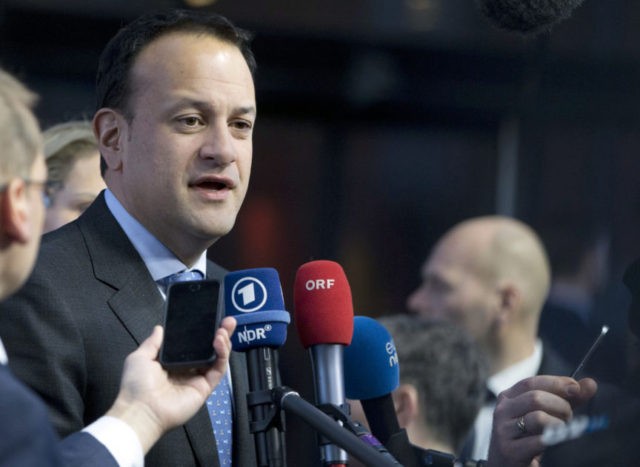BRUSSELS (AP) — The European Union issued a stark assessment of the gridlocked Brexit talks Friday, saying there’s been “no substantial progress” on the key issue of the Irish border and advising EU nations to ramp up their preparations for the possibility that Britain could crash out of the bloc without a deal.
In conclusions at a Brussels summit, the 27 other EU nations told the U.K. that it must produce “realistic and workable proposals” for what kind of post-Brexit relationship it wants.
“There is a great deal of work ahead and the most difficult tasks are still unresolved,” European Council chief Donald Tusk told reporters. “This is the last call to lay the cards on the table.”
Brexit was relegated to a brief discussion at an EU meeting whose main focus was to ease a European political crisis over migration.
With nine months until the U.K. officially leaves in March, frustrated EU officials say divisions within the British government over Brexit are blocking progress on a divorce deal.
“To be frank, the overwhelming feeling is that the British give the impression that they are negotiating more with the British than with the European Union,” said Belgian Prime Minister Charles Michel.
In its statement, the EU called for “intensified efforts” to get a deal, and said member states, EU institutions and businesses should “step up their work on preparedness at all levels and for all outcomes.”
The bloc said it was concerned “that no substantial progress has yet been achieved on agreeing a backstop solution for Ireland/Northern Ireland” — one of the thorniest issues in the divorce talks.
Britain has promised to maintain an invisible border, free of customs posts and other infrastructure, between Northern Ireland and the Republic of Ireland — the U.K.’s only land frontier with an EU member.
Looking forward to constructive meeting with @theresa_may and @HMcEntee on #Brexit. Good to meet up again and lots to discuss pic.twitter.com/w2VUBLq9mw
— Leo Varadkar (@campaignforleo) June 28, 2018
EU officials are impatient to hear detailed proposals from Britain for how that can be achieved, given May’s insistence that Britain will leave the EU’s customs union.
EU chief Brexit negotiator Michel Barnier said that “huge and serious divergences remain, in particular on Ireland and Northern Ireland.” He invited U.K. officials back to Brussels on Monday for renewed talks.
Irish Prime Minister Leo Varadkar said there had been “inadequate-slash-no progress” on resolving the border issue, and French President Emmanuel Macron said bluntly: “We can no longer wait.”
The EU also said there was no agreement yet on Gibraltar, the British enclave at the tip of the Iberian Peninsula. Spain has demanded its return for centuries.
British Prime Minister Theresa May insisted her nation was ready to “intensify and accelerate the pace of negotiations.”
At the heart of the Brexit impasse is a split within May’s Conservative administration about how close a relationship to seek with the EU after Brexit. The British leader is caught between pro-EU parliamentarians who want to retain close economic ties with Britain’s biggest trading partner, and pro-Brexit lawmakers who want a clean break so Britain can strike new trade deals around the world.
British divisions look set to come to a head on July 6, when May gathers her fractious Cabinet at Chequers, the prime minister’s country retreat, to try to draw up a unified plan for future trade and security ties with the EU.
Barnier said he was awaiting the position paper the U.K. government plans to produce after the Cabinet meeting.
“I hope it will contain workable and realistic proposals,” he said. “The time is very short.”
Lives Put ‘at Risk’ by EU Bosses Blocking UK Security Pact, May Warns National Leaders https://t.co/qT5MMGrtsg
— Breitbart London (@BreitbartLondon) June 29, 2018
Britain, meanwhile, is frustrated by what it sees as the bloc’s inflexible approach in negotiations.
EU leaders have warned, repeatedly, that Britain can’t cherry-pick benefits of membership, such as access to the EU’s single market of 500 million consumers, without accepting the responsibilities that come with being in the bloc, including allowing free movement of EU citizens to the U.K.
Britain hopes to get tailor-made arrangements, both on trade and on security.
At Thursday’s summit dinner, May warned her EU colleagues against shutting Britain out of key law-enforcement bodies after Brexit, saying that could endanger European security.
The stalemate in talks has heightened fears in London and other European capitals of a “no-deal” Brexit, in which the U.K. crashes out of the bloc with no new framework for relations. EU officials worry that the timetable the two sides have set themselves — to reach a divorce agreement by October so that EU national parliaments can ratify it before Britain leaves the bloc in March — is slipping out of reach.
Lithuanian President Dalia Grybauskaite said all involved should work hard to avoid a no-deal scenario.
“It is in nobody’s interests at all to have a hard landing,” she said.
Associated Press writers Lorne Cook and Raf Casert contributed to this story.

COMMENTS
Please let us know if you're having issues with commenting.